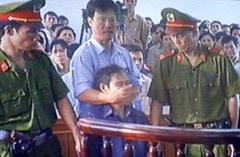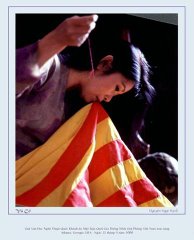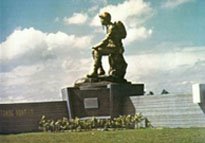Reporters Without Borders voiced dismay today at the news that the Vietnamese government has decided not to renew BBC World Service correspondent Bill Hayton’s press visa. Hayton will have to leave the country by 15 March.
“The government has begun a crackdown on dissident groups, so administrative obstruction is used to get rid of a foreign correspondent who is an embarrassing witness,” the press freedom organisation said. “This is scandalous, and shows how archaic and repressive Vietnam’s laws on the work of foreign journalists are. We urge the international community, especially the European Union, to react.”
This is the first time a foreign reporter has been forced to leave Vietnam since 2000, when French journalists Sylvaine Pasquier of L’Express and Arnaud Dubus of Libération were expelled.
The foreign ministry’s press department told Hayton on 6 March that his visa would not be renewed. Hayton announced he was being expelled at a meeting at which Vietnamese officials were present. He has been in the country since May of last year on a visiting journalist’s visa. The authorities now refuse to give him a permanent correspondent’s visa.
Under the current regulations, a news organisation must have a bureau in the country in order to have an accredited correspondent. The BBC has complied with all the requirements but the response has been delayed without any explanation being given. According to sources in Hanoi, the public security ministry pressured the press and immigration services into forcing Hayton to leave.
Hayton seems to have irritated the authorities by his coverage of the repression of dissidents. Like many of his colleagues, he refused to comply with the Vietnamese rules requiring foreign journalists to request permission to interview a Vietnamese five days in advance.
Below are Bill Hayton's comments:
Hi,Yes it's correct - I have to leave by Thursday. It's a convoluted talebut the essence is that the Foreign Ministry Press Dept says it can'tconsider my visa application until it considers a separate applicationfrom the BBC to re-open its Hanoi office. I believe that this is simplya ruse to get me out. For example, I was told that my family could applyfor tourist visas until things were sorted, but that I had to leave thecountry. If it's simply a question of waiting for the procedures thensurely I would be allowed to stay too.
I have upset the Foreign Ministry Press Dept on several occasions.During APEC, shortly after I reported on Human Rights' Watch'sallegations that street children had been taken off the streets of Hanoifor the summit, I approached the government spokesman Le Dung for acomment on the barricading of a number of dissidents in their houses. Heshouted at me in the summit venue corridor that my visa would be indanger if I pursued such stories. There have been other occasions too. Ionce set up a meeting with dissident Pham Hong Son by phone only to becalled for a meeting at MOFA one hour before the allotted time to bereminded of the need to clear all interview requests through the PressDept. When I got to PHS's house there was a guard of around six peopleto meet me and a helpful student with excellent English to translate thepolice's objections to my presence. There are many other examples.
Vietnam's press regulations make journalism almost impossible forforeign correspondents. According to MoFA Circular 84/TTLB, issued 31December 1996, Article 13, "In order to carry out journalisticactivities mentioned in the Regulations, the resident journalists mustsend their requests on a case-by-case basis to the MoFA AT LEAST FIVEDAYS IN ADVANCE and are not allowed to carry out those activities beforethe issuance of the 'Press Permit' by the MoFA."
Suffice to say that almost every foreign correspondent breaks thatregulation almost every working day. However, the regulation is onlyenforced when the authorities choose to do so. You can probably guessthe kinds of subjects in which the regulation is more strictly enforced.
According to friends of friends, the pressure not to renew my visa camefrom outside MOFA but MoFA didn't object since I've annoyed them toomuch. You can either break the regulations or report on controversialsubjects - but if you do both then you get two lots of enemies.
I only came to Vietnam for a year. As a result I felt less pressure toabide by the regulations since I believed the worst that could happenwas an early departure from Vietnam - which was unlikely to affect mylivelihood. Ironically I was due to leave at the end of this monthanyway but the authorities seem to want to make a point by getting meout two weeks early.
I think that we should think about the position of foreigncorrespondents in Vietnam in a similar way to the debate about'embedded' reporters with the military. There's a fine line to be walkedhere between self-censorship in order to remain here and truth-tellingwhich could result in a loss of access. Other journalists seem to manageit better than me!
Bill Hayton(Soon to be ex) BBC reporter, Hanoi
Freedom of Speech Under Communism

Favorite Videos
We Will NEVER Forget.....

Favorite Links
Gone...but not forgotten.



Why this Blog?
There are 2 main reasons for this site:
1) There are many young Vietnamese who care about issues concerning Vietnam and the Vietnamese Diaspora, but cannot, or are not very proficient, at reading Vietnamese. Therefore, this site compiles and disseminates these news in English, so that the new generation of Vietnamese around the world can become more aware and, thus, closer to issues in the homeland.
2) Young Vietnamese have many ideas, many differing views on the prospects to democratize and develop Vietnam. The argument for peaceful development verses demands for justice and human rights. Which comes first? Can a civil, peaceful society be built without foundations of social justice?
These are the issues YOU can debate on this site. But remember, say what you mean, and mean what you say, but don't be mean when you say it.
1) There are many young Vietnamese who care about issues concerning Vietnam and the Vietnamese Diaspora, but cannot, or are not very proficient, at reading Vietnamese. Therefore, this site compiles and disseminates these news in English, so that the new generation of Vietnamese around the world can become more aware and, thus, closer to issues in the homeland.
2) Young Vietnamese have many ideas, many differing views on the prospects to democratize and develop Vietnam. The argument for peaceful development verses demands for justice and human rights. Which comes first? Can a civil, peaceful society be built without foundations of social justice?
These are the issues YOU can debate on this site. But remember, say what you mean, and mean what you say, but don't be mean when you say it.
Blog Archive
-
▼
2007
(106)
-
▼
March
(28)
- A Show (and Tell) Trial in Vietnam
- Dissident Catholic Priest Sentenced to 8 years in ...
- Dissident Catholic priest challenges Vietnam court
- The Not-So-New Vietnam - Wall Street Journal
- Vietnam repeals detention practice
- Vietnam crackdown targets dissidents
- Some liberties thrive, but communist regime allows...
- Democracy Alert: Growing Repression in Vietnam
- Vietnam Security Forces Threaten Family Members Of...
- Vietnam: Getting Away With Murder (Human Rights Re...
- Vietnam Watch News Roundup -- March 25, 2007
- Vietnam Watch News Roundup -- March 23, 2007
- Vietnam rejects Human Rights Watch's ‘wrongful rem...
- Vietnam Watch News Roundup -- March 21, 2007
- Journey from the Fall opens this Friday
- Interview with the wife of attorney Le Quoc Quan a...
- Human Rights Watch condemns Vietnam "crackdown" on...
- Vietnam to Consider Freeing Journalist After Inqui...
- Top Vietnamese Buddhist Slams Detentions Amid Ongo...
- Authorities refuse to renew BBC correspondent’s visa
- Republican lawmakers blast Vietnam rights violatio...
- Rep. Lofgren Calls on Secretary of State Rice to A...
- Vietnam: Crackdown on Dissent in Wake of WTO and APEC
- Kinks in Vietnam's armour
- 3,000 workers at Taiwanese factory in Vietnam go o...
- Vietnam police arrest two dissident lawyers in Hanoi
- Vietnam's communist authorities' desperate repress...
- Vietnam: A Paradise Haunted by Human Rights Abuse
-
▼
March
(28)

No comments:
Post a Comment